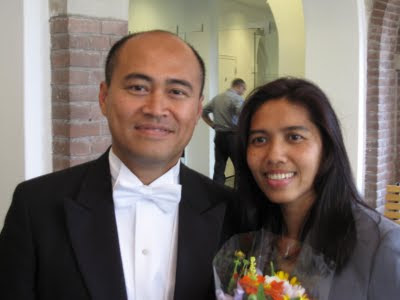Voor allen: moge het tot zegen en vreugde zijn. Vrede en welvaart in families, onder oude en nieuwe Nederlanders, onder de moslims zelf, in Syrië en Libië, ook tussen Sunni en Ahmadi moslims in Indonesië.
Op verschillende manieren was het deze Ramadan wat minder: minder iftarmaaltijden. Er was minder subsidie voor de groots georganiseerde met speeches vooraf, die tot verbroedering moeten leiden. Het was ook laat in de avond: in het begin van Ramadan was er pas iftar om 21.45 en dat liep terug na kort na negenen. Zelfs als je vanaf 12 uur 's middags vastte, was dat toch al een stevige periode. Overigens vond ik het zelf best prettig om een tijdje minder te doen. Niet alles hoeft te groeien, misschien zelfs de economie niet (tenminste niet voor veel mensen in Nederland).

Een mooi Ramadangeschenk was enkele dagen geleden de aankomst van de dissertatie van Fredrik Doeka uit Kupang, Oost/Indonesië. Hij heeft een boek vol verrassingen geschreven over de rijke Mozes-traditie, bij Indonesische moslims en christenen. Zij zijn ook verbonden in waardering en belangstelling voor een van die kleurrijke grote personen van de mensheid, die wel een enkele keer in de fout ging (opvliegend, sloeg beetje onschuldige Egyptenaar dood; wilde God zelf wel zien) maarjuist zo ook een mooi voorbeeld voor allerlei mensen is geworden.
Fredrik Doeka promoveert hierop in Utrecht, dinsdag 20 september 2011, 12.45 precies in de Senaatszaal van de Aula van de Universiteit aan het Domplein in Utrecht. Van harte welkom. Dat zou een mooi slot van het suikerfeest-lebaran-idul fitr zijn.
Bij Idul Fitr wensen horen verontschuldigingen. Natuurlijk dat rare woord Nederlands op de titel: toch een zetduiveltje bezig geweest. Mohon maaf lahir batin! A'udhu minal syatanil rajim!



